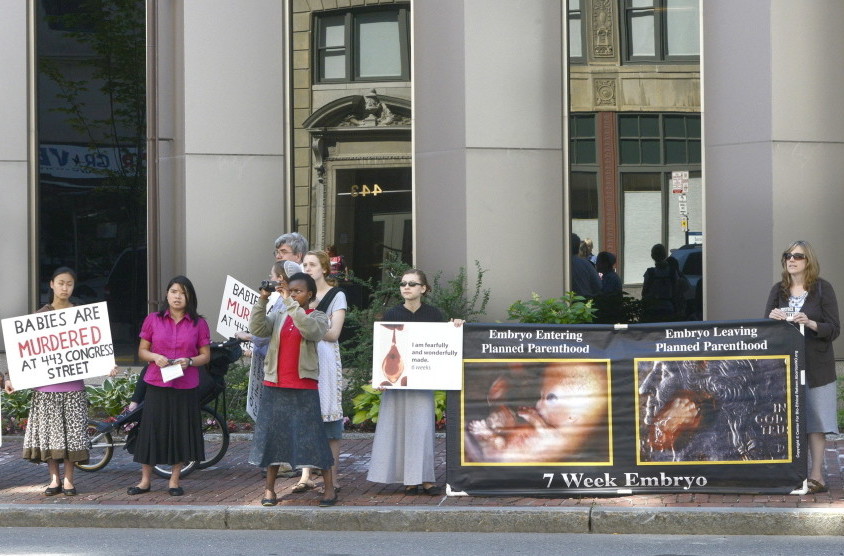Anti-abortion activists won their fight to have the city of Portland lift its 39-foot no-protest zone around a Portland clinic that provides abortions, but several who sued the city over the buffer say that is not enough.
The activists said they still want a federal court to award them money, as little as $1 in “damages,” to set a legal precedent and to show that the city ordinance infringed upon their constitutional rights.
The Portland City Council voted to remove the buffer on July 7, two weeks after the U.S. Supreme Court issued a unanimous decision in a similar Massachusetts case, ruling that a 35-foot buffer zone around clinics in Massachusetts violated the free speech rights of anti-abortion demonstrators.
The activists’ attorneys argue that the council has indicated it will try to pass another version of a buffer zone around the entrance to the Planned Parenthood clinic on Congress Street in the near future, and that a ruling specific to the Portland case is necessary to establish that the first ordinance did deprive their clients of their constitutionally guaranteed freedoms, even if only for a short time.
“This case is not about money at all,” attorney Erin Kuenzig said in an email Wednesday. “A ruling in our favor would set a precedent and would be persuasive authority for a judge to consider if Portland decides to enact a similar buffer zone ordinance. Such an order would also, hopefully, cause the city of Portland to tread more carefully in the future when it comes to unnecessarily restricting the constitutional rights of its citizens.”
One of the city’s attorneys, Patricia McAllister, said Wednesday that the plaintiffs’ goal is to gain a formal court ruling in their favor.
“They want a legal ‘win’ here,” McAllister said. “What the city has argued is we have repealed the ordinance. It’s moot.”
McAllister argued that until the U.S. Supreme Court ruling on June 26, Portland’s buffer zone ordinance was legal under the “law of the land” established under a previous ruling by the 1st Circuit Court of Appeals in Boston. When the nation’s highest court issued its opinion trumping the 1st Circuit decision, the city acted quickly to comply with the new law.
The city’s lawyers filed a motion in U.S. District Court in Portland a day after the city council lifted its buffer zone ordinance, asking Judge Nancy Torresen to dismiss the case because without the zone, “there is no longer a controversy here.” The city filed its final legal brief in support of that motion Tuesday, and the matter is now with the judge.
But attorneys for the activists – Daniel and Marguerite Fitzgerald of Shapleigh and their children and Richmond resident Leslie Sneddon – countered in their legal brief that dismissing the case would ignore that their free speech rights were denied under threat of fines and police action.
“A basic purpose of an award of damages … is to compensate people for injuries caused by the deprivation of their constitutional rights, and this purpose would be defeated if injuries resulting from the deprivation of constitutional rights went completely uncompensated,” the activists’ attorneys, Kuenzig and Erin Mersino of the Thomas More Law Center in Michigan, said in their written argument filed July 29.
For about a year before the Portland ordinance was enacted, 10 to 25 anti-abortion protesters, including children, gathered regularly in front of Planned Parenthood’s entrance at 443 Congress St., some holding large signs with graphic photos of aborted fetuses. Some shouted Bible verses at women entering the clinic and called them murderers.
Soon after the protests started, Planned Parenthood hired police officers to ensure the protests did not get out of control. The clinic also had volunteers in brightly colored vests who helped patients navigate the crowd.
Portland spokeswoman Jessica Grondin said on Wednesday that city staffers are working on various alternatives to the repealed buffer zone ordinance. Those options are expected to be presented to the City Council’s Public Safety, Health and Human Services Committee on Sept. 9, though it was not immediately clear when the committee and the full council might vote on the alternate options.
While the U.S. Supreme Court ruling rejects the 35-foot Massachusetts buffer zone and thereby indirectly rejects Portland’s ordinance, it does not call into question a so-called “floating buffer” that Massachusetts has adopted that is meant to prevent protesters from getting any closer than six feet from unwilling listeners if they were within 18 feet of a clinic.
The floating zone was modeled after a Colorado law that was upheld by the U.S. Supreme Court.
Staff Writer Kevin Miller contributed to this report.
Copy the Story LinkSend questions/comments to the editors.



Success. Please wait for the page to reload. If the page does not reload within 5 seconds, please refresh the page.
Enter your email and password to access comments.
Hi, to comment on stories you must . This profile is in addition to your subscription and website login.
Already have a commenting profile? .
Invalid username/password.
Please check your email to confirm and complete your registration.
Only subscribers are eligible to post comments. Please subscribe or login first for digital access. Here’s why.
Use the form below to reset your password. When you've submitted your account email, we will send an email with a reset code.